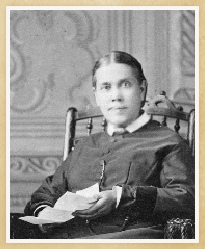



Links | . Privacy Policy

Revelation Revisited © 2013

The descriptive use of another writer’s work is a common occurrence. In fact, Ellen White frequently used the Bible writings in just this way. I first discovered this when I stumbled on her use of Matthew 24:21-22. That passage talks of a great tribulation – greater than any that came before it or would come after – a time of trouble so great that no one would survive if it were not cut short.
Much to my surprise and consternation, I found that Ellen White seemed to apply this scripture both to the tribulation of the Dark Ages and to the future Time of Trouble prior to the return of Christ.
I remember calling my pastor in a bit of distress. I was really troubled over the fact that she made application of this passage to two different persecution periods, while only one of them could really be the “greatest.” My pastor was a wise man, and took the time to explain to me that Ellen White often used scripture “descriptively.” In other words, she found that a particular passage expressed exactly what she wanted to say about a situation, and so she used it for that description. She wasn’t giving a Bible study on prophecy. She wasn’t saying that the text pointed to a specific event, or even arguing for multiple fulfillments. She was just making use of the word picture it painted.
Likewise, we find that the writings of Ellen White contain a rich treasury of description. In her long career as a writer, she just seemed to get better and better at painting vivid word pictures of the dramatic events she was shown. Since Adventists are familiar with those word pictures, it just makes good sense to use them...
… but not authoritatively. And that takes us to point number 2.
The ground-rules used in regard to Ellen White
Fourth, she always considered her writings as human attempts to express the truths she understood. She was always on the lookout for inaccuracies and errors, and corrected them as soon as she became aware of them.
I have no doubt that Ellen White was used by God as a messenger. Scripture shows that God has frequently chosen such messengers. In fact, our study will look forward to a time when God will select 144,000 messengers to communicate with all mankind. But prophets are not infallible. It was the great prophet and Apostle Paul who pointed out that, “We know in part and we prophesy in part.” If that was true of Paul, it is also true of every other prophet.
We cannot claim infallibility or omniscience for a woman who did not claim those things for herself.


Ellen G. White
The Prophetic Role of Ellen White
Yes, we accept that Ellen White had a prophetic mission. But in this study the use of her writing is deliberately and carefully restricted. Why? Because that’s exactly the way Ellen White would have wanted it! Here, then, are our rules:
There are several assumptions that underpin the idea of using Ellen White to “prove a point”. First, we have to assume that she is an unquestionable expert on all points of scripture. Second, we have to assume that her every use of scripture was “authoritative” instead of “descriptive.” Third, we have to assume that God revealed to her all the truth he wishes us to know. Fourth, we have to assume that no human imperfections tainted any of her work.
That’s a lot of assumptions – not one of which is safe to make.
First, she never claimed to be an expert on all matters of scripture. In fact, she never set forth a systematic theology based on rigorous scriptural exegesis. That isn’t the way she used scripture.
She used it pastorally.
Second, as we saw above, she often used scripture in a “descriptive” manner. When she has used a scripture passage descriptively, we cannot turn it into an “authoritative” statement.
Third, Ellen White never stated that all truth had been revealed to her. In fact, the opposite is true. She stated repeatedly that truth continues to advance, and was upset that people wanted to use her statements as absolutes. She never stopped urging people to study the Bible, pointing to it as the only reliable source of truth.
2. We will not use Ellen White’s writings to prove a point.
This restriction stands on two pillars. The first is the “progressive truth” principle. Since truth is progressive we cannot be reflexively resistant to new discoveries. God may – and I think it is likely – choose to show His end-time servants a facet of prophecy’s truth that has been previously clouded.
The second pillar of reasoning upon which this restriction rests is the primacy of the Bible as an avenue for divine communication. To the Christian there is no source with higher authority than Scripture. This has been understood from ancient times. The Bible is the standard to judge and evaluate all other claims of authority and truth. Paul even instructed the early church to reject the testimony of angels if it contradicted the truth they had already received.
Ellen White well understood this concept, and referred to her writings as a “lesser light to lead men and women to the greater light.” She consistently spoke of the authority of the Scriptures, and resisted any effort to place her writings on equal footing with the Bible.
From what I have been able to learn of Ellen White, none of these restrictions on the use of her writings would surprise her or bother her. We know enough of Ellen White’s history to know of various positions that she held and then discarded as she received additional light. We know that she made numerous statements that the Bible should be our teacher, and that no human had the authority to interpret the Bible for another.
We know that she did not hold that her views were infallible, and stated that we needed to remain open to changing our positions as new truths are uncovered. This seems especially true of the Book of Revelation. She strongly urged that Revelation be diligently studied, implying that additional light was to come from this source; “When we as a people understand what this book means to us, there will be seen among us a great revival. We do not understand fully the lessons that it teaches.” Testimonies to Ministers, p.113
If God blesses our research into Revelation with new understandings of these ancient texts, we need not look to what Ellen White believed to see if our understanding is correct. Unfortunately, since her death, she has not been able to change her views! We can only assume that if she were alive today that she would continue to advance in truth as it was revealed. That is precisely what we, too, must do.
1. We will use Ellen White’s writings descriptively - not authoritatively.
3. We will not let Ellen White’s understanding of a passage restrict or limit our understanding of that passage.
While this article is far too short to really deal with this topic, we do believe that Ellen White was selected by God to receive a prophetic gift. She was used as a messenger to give instruction and guidance to the church in its formative years. She wrote timely letters of counsel to struggling church members. She advanced the cause of health and temperance. She wrote inspiring books with wonderful insights into the gracious and loving character of God. And – as with many prophets – she was given glimpses of events yet ahead of us, events of mammoth proportion.
Why borrow trouble?
As Seventh-day Adventist laymen, we originally developed the Revelation Revisited Bible study for a Seventh-day Adventist audience, with whom we were eager to share these insights In that context, the judicious use of Ellen White’s statements - and particularly, the things she saw in visions of end-time events - makes perfect sense, as they could give the student some sense that even though our assertions may be different than what they had been taught, that they were consistent with what Ellen White foresaw.
But when these teachings are posted on the internet, the audience is no longer uniquely Adventist. Why not just leave out any reference to Ellen White, especially when many non-Adventist Christians may have a negative impression of her work?
The simplest answer is that we would rather just be up front with people about what we believe. We don’t want to hide our biases. However, we believe that the rules we have used in regard to Ellen White’s writings ensure that this remains a BIBLE study, as it should.
Who knows? Maybe our fellow Christians, when seeing how consistently she supports the truths of Scripture, will be willing to undertake a broader re-examination of her work.